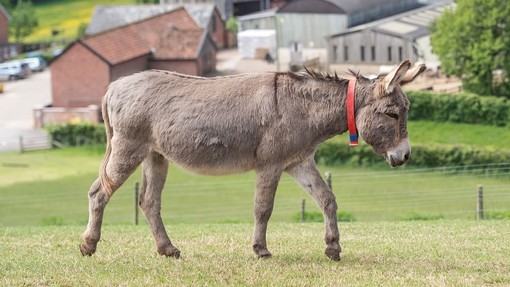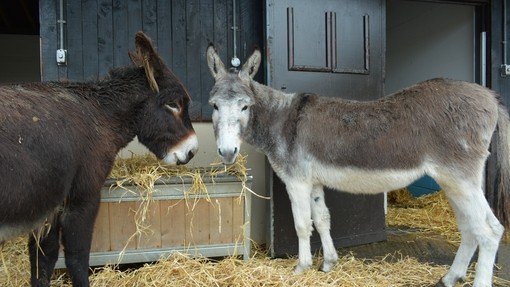Managing an underweight donkey
Donkeys should be weighed and condition scored regularly to monitor weight loss or gain. Download our Donkey Weight Estimator Chart and Donkey Body Condition Score Chart to assess your donkeys weight and body condition from our factsheet Monitoring your donkeys weight.
If your donkey is underweight, the provision of shelter is essential, but you should also consider a donkey rug to keep your donkey warm during the colder months so that energy is not unnecessarily used up. Additionally, a faecal egg count test should be performed regularly and donkeys wormed as and when necessary according to the results.
Underweight donkeys should not be initially overfed and any changes or increases to their diet should be done very gradually to avoid digestive upset.
Feeding recommendations
- Assuming the donkey has no dental problems, ad lib straw and good quality hay or high fibre haylage (e.g. Horsehage High Fibre) should form the main part of the donkey’s diet.
- If teeth are poor, a low sugar and starch hay replacement product (e.g. Mollichaff Donkey or Spillers Happy Hoof) can be fed instead. See factsheet Feeding donkeys with dental problems.
- High fibre nuts (e.g. Saracens Donkey Diet or Spillers High Fibre Cubes) can be a good addition to the diet for encouraging weight gain and are best fed soaked.
- Speedi-Beet can be useful as an appetising top dressing to high fibre nuts, feeding no more than 250g of soaked speedi-beet at a time.
- For particularly underweight donkeys it may be useful to add small quantities of alfalfa to the diet as this has a higher level of protein. Alfalfa can be added to the diet in a short chop form (e.g. Mollichaff Hoofkind or Hi Fi Lite) or alternatively alfalfa pellets can be fed (e.g. Fibre Beet which must be soaked prior to feeding).
- A forage balancer such as Top Spec Comprehensive would be a good addition to the diet of an underweight donkey and will provide essential protein, vitamins and minerals that will aid weight gain.
- Once the donkey starts to gain weight and reaches a body condition score close to ideal the type of forage balancer can be changed to a lower protein product e.g. Top Spec Donkey Forage Balancer.
- Top Spec balancers are fed at a rate of 100g per 100kg bodyweight per day (i.e. 180g per day for a 180kg donkey).




